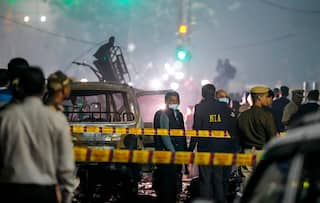Nigerian Citizen Becomes 9th Patient To Test Positive For Monkeypox In Delhi. India Tally Rises To 14
A Nigerian citizen has become the ninth patient to test positive for the monkeypox virus in Delhi.

A Nigerian citizen has become the ninth patient to test positive for the monkeypox virus in Delhi, according to officials quoted by news agency PTI. With this, the tally of monkeypox cases in India rises to 14. Monkeypox is a rare zoonotic disease (infectious disease that is transmitted between species from animals to humans or from humans to animals) caused by infection with monkeypox virus, and does not spread easily between people.
Most people recover from monkeypox within a few weeks as it is usually a mild self-limiting illness. However, some individuals can suffer from severe illness.
Nigerian citizen becomes 9th patient to test positive for monkeypox in Delhi; India tally rises to 14: Officials
— Press Trust of India (@PTI_News) September 19, 2022
On September 16, a Nigerian woman tested positive for monkeypox in Delhi. She was admitted to Delhi's LNJP Hospital.
The first case of monkeypox in Delhi was reported on July 24. The LNJP Hospital has been made the nodal facility to treat patients with monkeypox infection.
ICMR Study On First Fatal Case Of Monkeypox In India
After India recorded its first fatal case of monkeypox in July, the Indian Council of Medical Research (ICMR) conducted a study to obtain key insights into monkeypox infection. The study reports that in cases with no active skin lesions, oropharyngeal swabs (OPS), nasopharyngeal swabs (NPS) and urine samples should be considered as critical specimens for monkeypox diagnosis.
The first fatal case of monkeypox in India from Kerala highlights the importance of maintaining a high index of suspicion to diagnose the viral disease in the people exhibiting atypical manifestations and exanthematous fever (illness that produces skin infection), the study states. The study describing the findings was published as a pre-print on September 14.
As many as 14 cases of monkeypox have been reported in India so far. Of these, five are from Kerala and nine are from Delhi.
Though there is a very low risk of transmission to the general population, monkeypox can be spread when someone is in close contact with an infected person.
The monkeypox virus belongs to the Orthopoxvirus genus in the family Poxviridae, and was first discovered in 1958 when two outbreaks of a pox-like disease occurred in colonies of monkeys kept for research.
ALSO READ | EXPLAINED: Is Monkeypox A Sexually Transmitted Disease? Know What Experts Say
Monkeypox Symptoms
The symptoms of monkeypox in humans are similar to but milder than the symptoms of smallpox. The infection can be divided into two periods — the invasion period and the skin eruption period. The invasion period lasts between zero to five days.
The disease begins with fever, headache, muscle aches, back aches, swollen lymph nodes, chills, and exhaustion.
Smallpox and monkeypox are different in the fact that the latter causes lymph nodes to swell, while smallpox does not. The swelling of lymph nodes is called lymphadenopathy. The incubation period of monkeypox is usually seven to 14 days, but can range from five to 21 days, according to the CDC.
During the skin eruption period, the patient develops a rash within one to three days after the appearance of the fever. The rashes begin on the face, then spread to other parts of the body.
Lesions progress through the stages of macules, papules, vesicles, pustules, and scabs before falling off. Monkeypox typically lasts two to four weeks.
Check out below Health Tools-
Calculate Your Body Mass Index ( BMI )







































